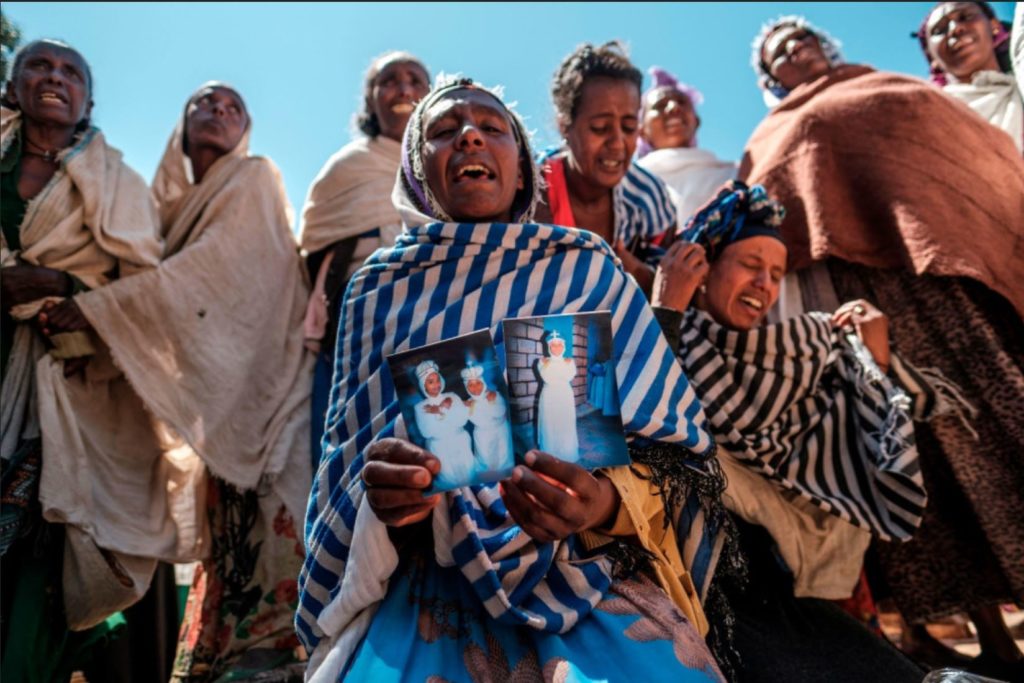Pursuant to Article 15 of the Rome Statute of the International Criminal Court, an open communication to Office of the Prosecutor (OTP), on grave violations of human rights in the Tigray region of Ethiopia, falling within the jurisdiction of the International Criminal Court submitted by Tedros Amanuel March 10, 2021

The Rome Statute of the International Criminal Court affirms in its Preamble paragraph 4 that: “…the most serious crimes of concern to the international community as a whole must not go unpunished and that their effective prosecution must be ensured by taking measures at the national level and by enhancing international cooperation.”
Paragraph 5 of the Preamble asserts that State Parties are:
“Determined to put an end to impunity for the perpetrators of these crimes and thus to contribute to the prevention of such crimes”
Multiple, consistent and reliable reports of alleged crimes against humanity, crimes of genocide, war crimes committed by Ethiopian and Eritrean soldiers, and alleged crimes of aggression committed by the leaders of the state of Eritrea in Tigray, have reached the international community. The United Nations has, therefore, the moral obligation and legal responsibility to conduct an independent investigation and bring the perpetrators to a court of justice through mechanisms of national and international cooperation and in particular through The International Criminal Court ( ICC) established for this purpose and which has jurisdiction over war crimes under Article 8, crimes against humanity under Article 7, crime of genocide under Article 6 and crime of aggression under Article 5(2) of the Rome Statute of The International Criminal Court.
Both Ethiopia and Eritrea are non-State Parties of the Rome Statute. Nonetheless, a referral by the UN Security Council can authorize the ICC to exercise its jurisdiction over crimes listed in the Rome Statute. The court has the decisional precedent of repealing the immunity and indicting a sitting president when the State through its national courts and legislation is genuinely unable or unwilling to persecute one of its nationals when accused of alleged war crimes and crimes against humanity committed within the territory under its jurisdiction. There is also an alternative indictment process in which a prosecutor independently conducts a preliminary examination of the alleged crimes falling within the ICC jurisdiction and files an application to an ICC judge (motu propio) and requests authorization to initiate an investigation.
I. The act of responsibility for crime against humanity
On 4 November 2020 the Ethiopian PM announced brusquely on social media that Ethiopian forces have started conducting airstrikes and sweeping military operations in the northern Tigray region.1 The army spokesman told reporters that the army plans to encircle the regional capital of Mekelle with tanks and attack it with artillery, and urged the civilian population to “save themselves, as there will be no mercy”.2 Tigray was shut down, and a total information blackout was imposed. There were cut-offs of electricity, telephone communications and the internet, and free humanitarian access to the people of Tigray and the four UNHCR dependent Eritrean refugee camps in the region was blocked.
A stream of evidence has since then leaked out of Tigray regarding heinous crimes, in particular crimes committed by the army of the pariah state of Eritrea. Wanton killings, pillaging, sexual violence, ethnic cleansing, destruction of heritage sites as well as the kidnapping of Eritrean refugees and their forced return to Eritrea have been repeatedly reported by refugees who succeeded to flee to the Sudan.3 The international community, including the AU, EU and the US, have repeatedly called for dialogue, transparency and independent investigation. The answer of a high government official Radwan Hussein is that Ethiopia “does not need a babysitter”.4
On January 15, 2021, the EU foreign affairs chief Josep Borrell stated that he had received consistent reports of ethnically targeted violence, killings, massive looting, rapes, forced return of refugees (to Eritrea) and possible war crimes.5 Likewise, on the same day, the UN High Commissioner for Refugees (UNHCR) Filippo Grandi acknowledged that he continues to receive reliable first-hand reports of gravely disturbing human rights abuses, including killings and forced return of refugees to Eritrea, and states that there is concrete indication of major violation of international law.6 On January 22, Pramila Patten, the UN special representative on sexual violation in conflict said she was greatly concerned by serious allegations including “a high number of alleged rapes” in the Tigrayan capital, Mekelle.7
Under Article 7 of the Statute, the ICC has the jurisdiction over crimes against humanity which include widespread and systematic attacks directed against any civilian population including murder, torture, rape and sexual violence and persecution against any identifiable group or collectively on political racial, national, ethnic, culture, religious, gender or other grounds that are universally recognized as impermissible under international law.8
II. The act of responsibility for war crimes
On January 22nd 2021, Poland became the first EU country to acknowledge and officially express its deep concern regarding the alleged massacre of 800 persons, the majority of whom were Christian believers and Christian priests, in front of the Church of Our Lady Mary of Zion in Axum.9 On January 27th 2021, the US called for the immediate withdrawal of Eritrean troops “given credible reports of looting, sexual violence, assaults in refugees camps and other human rights abuses”.10 On February 11, 2021 Human Rights Watch issued an extensive report that shows that the Ethiopian federal forces carried out apparently incriminate shelling of urban areas in the Tigray region in November 2020 in violation of the law of war.11 On February 21st 2021, the Swedish Radio programme Ekot included first-hand testimony from a deacon at the church present during the massacre.12 On February 25th, Amnesty International issued an extensive report on the Massacre in Axum based on evidence given by 41 independent witnesses, and concluded that indiscriminate shelling of Axum by Ethiopian and Eritrean troops may amount to war crimes, and that the mass execution of Axum civilians by troops may amount to crimes against humanity.13
Under Article 8 of the Statute, the ICC has jurisdiction in respect to war crimes which include the serious violations of international humanitarian law mentioned in the Geneva convention of 1949 and the Additional Protocol I of 1977 including indiscriminate attacks affecting the civilian population or civilian objects as well as offences specifically identified as war crimes including rape and other forms of sexual violence. Included in the category of war crimes are the following: the destruction of property; pillaging; outrages upon personal dignity; violence to life and person; intentionally directing attacks against personnel, industrial installations, material, units or vehicles.
III. The act of responsibility for crime of genocide
On the February 26th 2021, based on an internal U.S. government report, The New York Times wrote that Ethiopia is conducting “a systematic campaign of ethnic cleansing” through the use of force and intimidation and that whole villages were severely damaged or completely erased in the Tigray region. On the February 27th, the US expressed its grave concern and “strongly condemned the killings, forced removals and displacement, sexual assaults, and other extremely serious human rights violations “. On March 1st 2021, the CNN aired an eyewitness report on the massacre committed by Eritrean soldiers of over 50 persons including 20 Sunday school students on Maryam Dengelat Orthodox Tewadhdo Church when the congregation was celebrating Mass.
All major media outlets including the BBC, CNN, Al Jazeera, the New York Times, Reuters, The Washington Post and The Economist have by now reported on grave violations of human rights including ethnic cleansing in Tigray.
Whether intentionally, or otherwise, the war was ignited days before the seasonal harvest period, in the midst of the COVID pandemic and a massive locust infestation in the region. Together with a total blockade of Tigray, including access to humanitarian assistance, the war was bound to cause maximal damage to the economy and to the wellbeing of the civilian population of Tigray, resulting in over 2 million internally displaced people and over 60 000 refugees who have fled to neighbouring Sudan and 25 000 unaccounted Eritrean refugees in Ethiopia.
Under Article 6 of the Statue, the ICC has jurisdiction over the crime of genocide, genocide by killing of a group; genocide by causing serious bodily or mental harm; and genocide by deliberately inflicting on each target group conditions of life calculated to bring about the group’s physical destruction including using famine as an instrument of war.
IV. The act of responsibility for crimes of aggression
In an interview on February 8th 2020 on Eritrean National Media outlet the Eritrean president expressed his contempt for the Ethiopian Federal Constitution and all forms of electoral government and stated that “we will not fold our hands and sit still concerning matters that develop in Ethiopia” 14 and he added that Eritrea is “fulfilling its obligations” with respect to Ethiopia’s Tigray crisis. On July 20th 2020, the Ethiopian PM become the first foreign dignitary to visit the infamous and secretive SAWA military training camps, a visit which was reciprocated on October 12th 2020 by a visit by the Eritrean president to the headquarters of the Ethiopian Air Forces and the military industrial complex of Ethio-Engineering Groups in what some observers noticed as an indication of a final preparation for a “knock-out” against their common enemy, the regional government of Tigray. 15
Both the governments of Eritrea and Ethiopia continue to deny the participation of Eritrean troops in war in Tigray. The presence of Eritrean troops is, however, openly acknowledged by local officials of the government regional administration and war generals.16 Today there is irrefutable evidence of their massive participation and culpability in grave human rights violations, including rape, looting, mass killings, kidnappings of Eritrean refugees, and the dismantling of industrial complexes with their transfer to Eritrea.
On March 4th 2021, the UN High Commissioner for Human Rights Michelle Bachelet stated that, given the persistent reports of serious human rights violations and abuses she continued to receive, she stressed on urgent need for a prompt, impartial and transparent investigation that will hold those responsible accountable.17 On the same day, the UN Under-Secretary-General for Humanitarian Affairs Mark Lowcock, informed a Security Council session that “countless well-corroborated reports suggest their culpability for atrocities,” and added “Eritrean defence forces must leave Ethiopia and they must not be enabled or permitted to continue their campaign of destruction before they do so.”18 U.N. Secretary-General António Guterres and U.S. Ambassador Linda Thomas-Greenfield made statements that urged Eritrean forces to leave Tigray.
Under Article 5 (2) of the Statute, the ICC has jurisdiction over the crime of aggression which according Article 8 bis means “the planning, preparation, initiation or execution, by a person in a position effectively to exercise control over or to direct the political or military action of a State, of an act of aggression which, by its character, gravity and scale, constitutes a manifest violation of the Charter of the United Nations.”
The case for indictment of the president (non-elected) of Eritrea Isaias Afwerki, the minister of defence of Eritrea, and Eritrean military commanders in the Ethiopian Tigray region.
In 2016 the UN Commission of Inquiry submitted its conclusions to the UN Human Rights Council and to the Security Council of the UN recommending accountability on the gross and systematic violations of human rights and crimes against humanity committed by Eritrean authorities. No individual has been charged or punished for these grave violations of human rights in Eritrea. The recommendation of the Commission of Inquiry remains, pending action. Eritrean authorities have however, continued to commit crimes against humanity (Article 7) with impunity in Eritrea. Furthermore, in November 2021 the Eritrean president ordered the army to invade the Tigray region of Ethiopia and conduct a crime of aggression (Article 5), an army accused of committing alleged war crimes (Article 8), genocide (Article 6) and crimes against humanity (article 7).
On February 24, 2021 the current UN Special Rapporteur to Eritrea, Mohamed Abdelsalam Babiker, in his rapport to the Human Rights Council, underscored that nothing has changed in Eritrea and stated that he has “seen no concrete evidence of progress or actual improvement in the human rights situation in the country. Eritrea has not yet put in place an institutional and legal framework to uphold minimum human rights standards in a democratic society. The country lacks rule of law, a constitution and an independent judiciary to enforce the protection of and respect for human rights. Eritrea continues to have no national assembly to adopt laws, including those regulating fundamental rights and the right of the Eritrean people to participate freely in the public life of their country.” 19 He also expressed his concern about the fate of the Eritrean refugees abducted by the Eritrean army and taken back to Eritrea, and stressed the need for thorough investigation by an independent body.
The State of Eritrea has no national legislative mechanisms that enable it undertake an independent investigation into grave human rights violations. The Eritrean authorities remain unwilling to investigate or cooperate in the investigation of grave crimes against humanity committed in the territory within their jurisdiction or by Eritrean citizens in a neighbouring state.
The Office of the Prosecutor needs, therefore, to review and examine the documentation on the crimes against humanity (Article 7) between 2012-2016 submitted by the UN Commission of Inquiry on Eritrea, and to open an investigation after acquiring authorization from ICC judges, as in the case of Kenya, Ivory Coast, Georgia and Bangladesh/Myanmar.
The UN Security Council needs to take a decision to refer and authorize the ICC to investigate the alleged crimes against humanity (Article7), war crimes, (article 8) genocide committed (Article 6) in Tigray as in the case of the Sudan and crimes of aggression (Article 5) the is particular to the leaders of the Eritrean State.
The case for indictment of the Prime Minister of Ethiopia Abiy Ahmed, Birhanu Jula Gelalcha Chief of Staff and Ethiopian military commanders in Tigray.
The UN Security Council needs to authorize the ICC to investigate war crimes where command responsibility falls directly into the hands of the Ethiopian Prime Minister, the Ethiopian Minister of Defence, and the Chief of General Staff of Ethiopia Birhanu Jula Gelalcha (Article 8), crimes against humanity (Article 7), genocide (Article 6) committed by Ethiopian soldiers and militias from the Amhara region, as was the case in Darfur in Sudan.
Ethiopia has national legislature, a criminal justice system and a government agency – the Ethiopian Human Rights Commission, in charge of promoting human rights. An indictment process is therefore bound to meet resistance as it will impose certain restrictions and limitation on some state authority. Nevertheless, the Ethiopian government has refused or failed to use its national criminal justice system to investigate and to deal with perpetrators of war crimes and crimes against humanity – crimes which continue to accrue within its territory – or to allow a thorough investigation by an independent and neutral body,
The Ethiopian legal system remains genuinely unable or unwilling to persecute alleged war crimes, crimes against humanity and crimes of genocide committed by its nationals or nationals of other states, in the Tigray region of Ethiopia.
Uppsala 2021-03-10
Tedros Amanuel
Chairperson
Swedish-Eritrean Association of Human Rights and Democracy
Footnotes:
1. BBC 4 November 2020 Ethiopia PM orders military response to `base attack´
2. Aljazeera 22 November 2020 `Save yourselves´: Ethiopia warns Tigrayans of Mekelle
3. UNHCR, 4 December 2020, CNN 8 December 2020 `They left us for dead´ Tigray refugees tell horrors after Ethiopian troops vowed, they´d be safe.
4. Aljazeera 9 December Ethiopia says it ‘doesn’t need a babysitter’ as it dismisses calls for independent probes into the month-long conflict.
5. BBC 15 January 2021, Ethiopia Tigray crisis: EU concern over war crime report
6. Aljazeera 15 January 2021, `Major violations´ of international law ay Tigray refugee camps
7. Aljazeera 22 January 2021, `Disturbing’ rape allegations in Ethiopia´s Tigray conflict: UN
8. The Statute of the International Criminal Court (ICC) adopted in July 1998.
9. Statement regarding the massacre in front of the Church of Our Lady Mary of Zion in Aksum in Tigray region. Ministry of Foreign Affairs of Republic of Poland 22 January 2021(www.gov.pl)
10. BBC 27 January 2021. Tigray crisis: Biden administration calls for Eritrea troops to withdraw.
11. Human Rights Watch February 11, 2021 Ethiopia: Unlawful Shelling of Tigray
urban Areas (www.hrw.org)
12. sverigesradio.se 21 februari 2021: Vittnen talar om massaker i Tigray
13. Amnesty International 26 February 2021Ethiopia: Eritrean troops’ massacre of hundreds of Axum civilians may amount to crime against humanity (www.amnesty.org)
14. Eritrea ‘doing its obligation’ on Ethiopia’s Tigray crisis BBC 18, February 2020
15. Eritreahub.org Martin Plaut21 October 2020.
16. abcNEWS 7 January 2021. Ethiopian army official confirms Eritrean troops in Tigray.
17. Ethiopia: Persistent, credible reports of grave violations in Tigray underscore urgent need for human rights access – Bachelet Geneva March 4, 2021 (www.ohchr.org)
18. CNN 3 mars 2021 UN Security Council to discuss Ethiopia conflict following CNN investigation into Tigray massacre.
19. https://www.ohchr.org/EN/NewsEvents/Pages/DisplayNews.aspx?NewsID=26795&LangID=E















